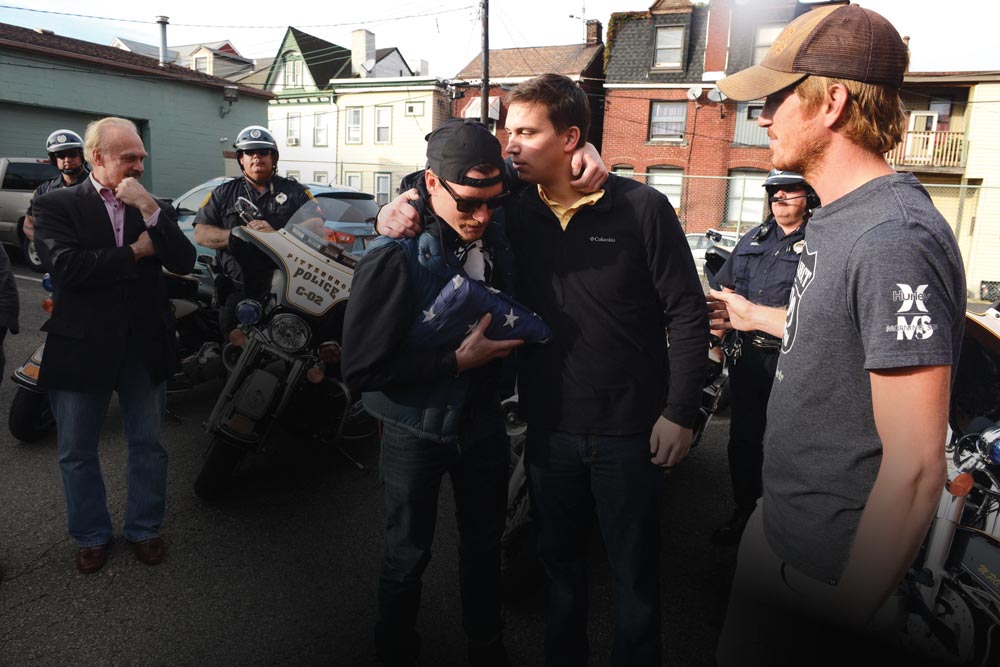 |
Political Science alumnus Theo Collins, ‘12 (right), embraces fellow war veteran and Project 22 filmmaker Daniel Egbert, at a Post Traumatic Stress awareness event in Pittsburgh last year. Looking on is four-time Super Bowl Champion and Pittsburgh Steelers legend Rocky Bleier (left), and fellow Project 22 filmmaker Doc King (right). The filmmaking team was presented an American flag by the Pittsburgh fire and police departments. Copyright ©, Pittsburgh Post-Gazette, 2014, all rights reserved. Reprinted with permission. |
“Project 22,” a documentary that raises awareness about veterans taking their own lives and offers real hope for them and their families, is scheduled for nationwide release this fall. Though not seen on camera, Theo Collins, ’12, has played an integral part of the production as associate producer.
The documentary tracks the 6,500-mile motorcycle cross-country journey of two combat-wounded veterans, Daniel Egbert, a former U.S. Marine sergeant, and Matt “Doc” King, a former U.S. Army medic. They interviewed researchers, health care providers and veterans — including many who had contemplated or attempted suicide. The film’s title was painfully inspired by the U.S. Department of Veterans Affairs’ estimation that 22 vets commit suicide every day.
The pair formed the non-profit Medicinal Missions to produce a film whose ultimate goal is to identify life-saving sources of hope and alternative forms of therapy for veterans afflicted with Post Traumatic Stress “Disorder” (PTSD).
“We prefer to call it PTS or Post Traumatic Stress,” explained Collins, who earned a bachelor’s in Political Science at Fredonia. “We’re big advocates of dropping the “D,” because calling it a disorder attaches a negative stigma and discourages people from learning more about their symptoms and how they can find treatment. It’s not a disorder. It’s a human construct and it’s part of the human condition.”
Confronting symptoms and working on one’s own path to healing is what resolves the affliction, according to Collins, and everyone’s path is different. “Our big mantra is that no one person has the same path. For some it’s equine therapy, for others it’s clay therapy or yoga,” he said.
Collins spent six years with the Marine Corps Reserve unit based in Buffalo, N.Y., and, during his junior year at Fredonia, was called up to active duty for 13 months and deployed to Afghanistan from 2010 to 2011. As an “up-armored vehicle commander,” he was responsible for a driver, a turret gunner, a medic and a pair of foot mobile Marines. Their task was to prevent improvised explosive devices (IEDs) from being placed on a major supply route.
“It was a lot for a 22-year-old to handle,” remembered Collins, who achieved the rank of sergeant and became good friends with Egbert, his squad leader. “We stayed close after we returned home. I learned about the project from him and offered my assistance.”
“The bonds you build when you’re in the military, and especially when you’re deployed to a combat zone, are ones that are not broken easily,” Collins added. “You have a connection to people you’ve never even met, but who you know shared a lot of the same experiences you’ve had. Learning about the issue and how serious it is shocked me at first, and I knew I needed to do something to help my brothers and sisters at arms.”
Despite attending law school at Duquesne University in Pittsburgh, Collins found time to assist Medicinal Missions as a “connector,” reaching out to people involved in ground-breaking research and treatment in Pittsburgh to be included in the film. Pittsburgh is in Allegheny County, which has the most Iraq and Afghanistan veterans in Pennsylvania. Other Pittsburgh connections include advisory board members Rocky Bleier, the four-time, Super Bowl-winning Pittsburgh Steeler running back and Army infantry veteran, along with Dr. Roger Brooke, a South African Army airborne veteran and clinical psychologist/professor at Duquesne.
With filming completed, Collins shifted his involvement to fundraising, public relations, regulatory compliance and a myriad of business-related matters. “My business and legal background allows our team’s creative members the freedom to concentrate on what they do best: making the movie,” said Collins, who is now Medicinal Missions’ associate director. “We’re working on how we can better connect veterans with some of the alternative healing methods that are highlighted in the film, and many more that were not.”
Theatrical release of the film in New York City and Los Angeles is scheduled for September, with wider distribution to follow. The group’s ultimate goal is to allow every veteran to see the film for free.



